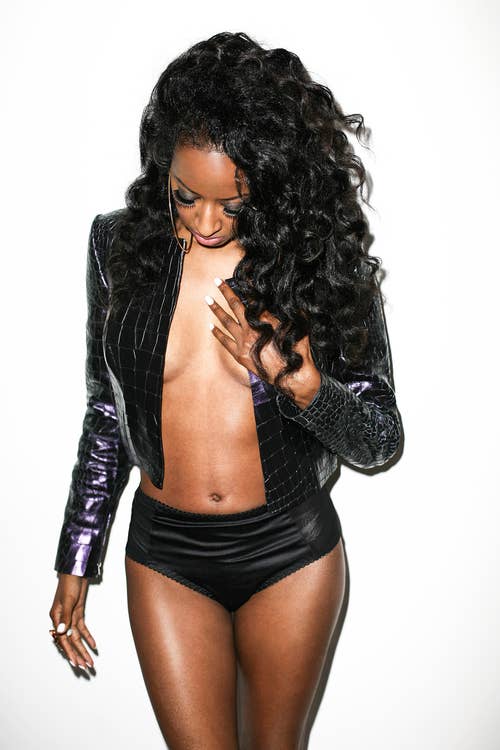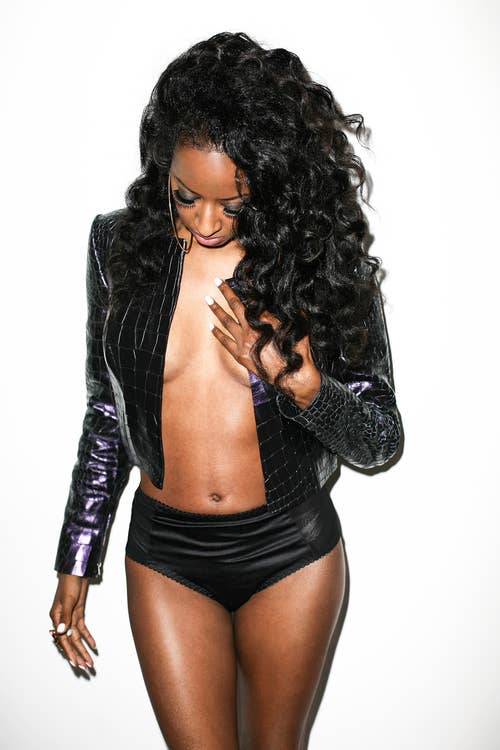
Beginning her career on pirate radio stations in London, Chanelle Calica, aka Shystie, went on to become one of the most acclaimed female MCs in the grime scene. Gaining prominence after her reply to Dizzee's seminal 2003 hit, "I Luv U", she became queen of the dubplate after starring in the cult-hit Dubplate Drama back in 2005, cementing her status as the First Lady of grime. Since then, Shy has been inspired by new sounds and scenes, flirting with dance music and making tracks for the club. After appearing on a track with U.S. rapper Azealia Banks last year and the relationship souring sooner than you can say "clash", Shystie jumped on the mic to deliver a diss track that made the rounds on social media, and when it comes to grime, all matters are settled in the studio.
Now back with a new single, "Stop", and a new EP, Exhalation, Shystie catches up with Complex for a nostalgic chat about her grimey past, her "EDM"-influenced present, and her strategy for getting her name in that Top 10 chart.
It's been widely reported that working with Azealia Banks didn't quite turn out how you hoped. What was that experience really like?
Working with that girl was a headache! At first, it seemed fun, but when the video had to come out, it was stress and headache. Maybe that's just her, as an artist. It's kind of her brand to disrespect as many artists that she can. UK artists generally seem less on their high horse and more down to earth.
Were you taking your cue from the clash culture of grime with your diss track, "Doppelganger"?
The thing with grime is, thanks to its DIY nature, you learn how to take things into your own hands. I just got straight in the booth and vented, and made it funny—that's hip-hop and grime culture. It wasn't out of my comfort zone. I'm from a scene where, if you do get disrespected, you put it on a dubplate and you put it out. Some of her fans were like, "Why is she doing that?" and it was like, "Look! That's the scene that I come from and that's what we do." If anyone says anything disrespectful about me, I’m going in the studio. It really is that simple.
Does grime it feel like a nostalgia scene to you?
Yeah, sometimes. When you look at someone like Fekky, who has the "Still Sittin' Here" remix with all Kano, Skepta and them guys on—to me, that's nostalgic. But to be totally honest, I don't really listen to grime that much anymore.
Forum culture played a huge part in the development of grime. How involved were you in that?
I came from forum culture. I used to be on loads of them! I even set my own one up when I got signed. I had my own website and loads of my supporters would be on there, and we used to battle. And now, I still see them in my mentions and they've made friends from the forums and go raves together [laughs]. I used to be on grime forums a lot, like RWD and a few others. My name was 'Newbie' and, on Blackchat, my name was something like 'SweetGirlShy' or something shit like that. And then there was the MySpace era. I had a few artist friends like Estelle in my top eight, but I cant remember the rest. I just remember that time being great.
Do you miss dubplate culture?
Yes! When I did the reply to Dizzee's "I Luv U", we had to go to shops like Rhythm Division and sell actual dubplates and records, and you're driving up and down and they were heavy! Now, if I was to ask my 22-year-old sister what a dubplate is, she would have no idea. It's a different time.
You played the lead in Dubplate Drama, which was a cult-hit. For a lot of people, it was their first introduction to the scene. What was that experience like?
It was amazing bringing a scene together. The director asked us who we wanted and I was like, "Everybody!" It was a massive platform to get our scene heard and it gave a really good insight. I think we got it pretty close to what studio and pirate life is like, it still feels authentic even now. Sometimes you see shows on TV and you’re like, "This doesn’t happen." But no, people were really stealing rigs from the rooftops. People were really having fights inside the studio. It was fun!
How important was pirate radio to the artist you are now?
I used to listen Heat FM, Mystic, Deja, and Freek FM. Freek gave me my first break, actually. That was one of the first station that I MC'ed on, when I was about 17. I used to have CDs that I would package with my friends and send over to Deja and Freek. But I heard nothing. They were not having it. So, anyway, Freek FM used to have live call-ins where you could call in and talk to the DJ, shout out your friends or whatever. And one day, I was like, "I'm an MC from London" and the DJ asked me to spit a lyric. I remember being so nervous, but I spat my first lyrics and the DJ asked me to come down to the studio. So, they invited me down to do a back-to-back set with them that weekend, and from there it was easy to get on to other stations. I started doing live call-ins a lot after that.
Is there a problem with how female MCs are marketed?
I think it's more about the girls moving forward together. They don't move forward enough, because everyone's too bitchy. Let's get in the studio, get your best bars together, and we'll just support each other.
"Stop" is the title of your recently released single, and it sees you making a move into more of a dance direction. Have you been influenced by the "EDM" sound from your time touring?
I've been to Prague and around Europe where the dance/EDM stuff is massive. When I first performed with Basement Jaxx, I was watching them perform "Where's Your Head At" and I looked over the balcony and, I swear, when the chorus dropped, everyone just went mad! I was like, "I need that reaction." Now, the dance songs I do get those kind of reactions. The charts at the moment are full of people like Jess Glynne and Katy B doing female vocals over dance, and that's what I want to be doing.
What are some of your best memories of raving in London, when you were younger?
There was One Man Standing, Rumble, Eros in Enfield and Temple in north London that I used to go to when I was about 16/17. I had a fake ID card that my friend used to make at college [laughs]. I remember one time not having my ID, so I went home, got my birth certificate and changed the date on it. Anyway, when I got to the club, I just unfolded this paper and gave it to the bouncer. He took one look at it and was like, "What the fuck! This doesn't prove anything. It doesn’t even have your picture on it." Thankfully, in the end, he just let me in. Those were the days!
How is your forthcoming EP, Exhalations, a reflection of how far you've come in your career?
It's just more grown up and a reflection of what I've been influenced by. The single is [Stop] is about not giving up. When I was younger, I was so excited! Now, after all these years, I'm like "Wow! This is hard work." This new EP is me just talking about music with different eyes. It's exciting that "Stop" has been playlisted—this is the first time I've ever been playlisted, believe it or not. When I came out, I never got on BBC Radio 1 and there was no 1Xtra. But now it's on MTV, so it's exciting. It's taken 10 years for this progress to happen.

